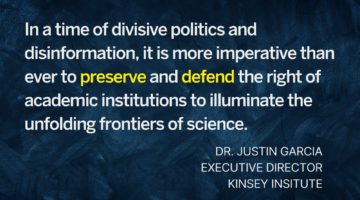Say “No” to No Nut November: The Health Benefits of Masturbation
November 9, 2022 by Emily Mendelson
It’s “No Nut November” once again. While this annual abstinence challenge seems to pick up some new participants each year, you may want to think twice before giving up masturbation for the month.
No Nut November began a few years ago when a group of men on the internet challenged each other to see if they could go a full month without masturbating. According to these individuals, taking a break from masturbation benefits both body and mind. They say it improves mental focus, heightens testosterone levels, and increases one’s ability to enjoy and appreciate life. The challenge is still going strong on Reddit, and members who are partaking this year have been posting daily updates for 2022.
However, despite the number of men who have joined the challenge, little to no research supports the claim that abstaining from masturbation yields these benefits. In fact, most research suggests the exact opposite.
For example, when you orgasm, your brain releases endorphins, which can make you feel both happy and sleepy after climaxing [1]. This is why some people turn to masturbation as a way to relax or help them fall asleep. In this way, masturbating can be a way of temporarily relieving stress and anxiety [2].
Research has also found that masturbation is linked to higher self-esteem [3], perhaps because it can be a way of helping you to better understand and get comfortable with your body. Masturbation is a form of sexual self-exploration that can tune you into your pleasure sources and facilitate sexual functioning. In fact, people who masturbate tend to have an easier time becoming aroused and reaching orgasm in general [4]. As a result, self-pleasure may even boost sexual satisfaction from partnered sex because you know what feels good and what kind of stimulation you need.
There may even be physical health benefits to masturbation. For example, frequent ejaculation is linked to a reduced risk of developing prostate cancer [5], the second most prominent cause of cancer deaths in American men.
Another myth related to No Nut November is that masturbating too frequently or too vigorously can decrease sexual function, such as the ability to maintain an erection and the ability to receive sexual pleasure from a partner. However, this claim has not been substantiated. In fact, researchers have found that there is no link between masturbation frequency and erectile dysfunction [6].
Some individuals who post in the No Nut November subreddit report participating in the challenge as a way to decrease their “addiction” to porn. Porn addiction is not a recognized medial or psychological diagnosis, and research finds that it’s generally not porn use per se that leads to problems; rather, it’s feeling morally conflicted about consuming porn. Thus, while taking a break from porn might provide some temporary relief for people who are distressed about using porn, it’s unlikely to resolve the underlying feelings of sexual shame that lead people to label themselves as “porn addicts” in the first place.
No Nut November may be a way that some individuals choose to develop a sense of community online; however, the basis for the challenge is not rooted in science and, instead, appears to be based on the false belief that masturbation is inherently unhealthy.
To learn more about the science of masturbation, check out this podcast episode with Dr. Joshua Gonzalez, a board-certified urologist who is fellowship-trained in Sexual Medicine.
This post was written by Emily Mendelson, Co-Managing Editor of Sex and Psychology. Learn more about Emily here.
Want to learn more about Sex and Psychology? Click here for more from the blog or here to listen to the podcast. Follow Sex and Psychology on Facebook, Twitter (@JustinLehmiller), or Reddit to receive updates. You can also follow Dr. Lehmiller on YouTube and Instagram.
Image Credits: Photo by Dainis Graveris on Unsplash
References:
[1] Mitrokostas, S. (2019, January 25). Here’s what happens to your body and brain when you orgasm. ScienceAlert. https://www.sciencealert.com/here-s-what-happens-to-your-brain-when-you-orgasm
[2] Leuner, B., Glasper, E. R., & Gould, E. (2010). Sexual experience promotes adult neurogenesis in the hippocampus despite an initial elevation in stress hormones. PloS One, 5(7), e11597. https://doi.org/10.1371/journal.pone.0011597
[3] Planned Parenthood. (2022). Is masturbation healthy? https://www.plannedparenthood.org/learn/sex-pleasure-and-sexual-dysfunction/masturbation/masturbation-healthy
[4] Carvalheira, A., & Leal, I. (2013). Masturbation among women: Associated factors and sexual response in a Portuguese community sample. Journal of Sex & Marital Therapy, 39(4), 347–367. https://doi.org/10.1080/0092623X.2011.628440
[5] Rider, J. R., Wilson, K. M., Sinnott, J. A., Kelly, R. S., Mucci, L. A., & Giovannucci, E. L. (2016). Ejaculation frequency and risk of prostate cancer: Updated results with an additional decade of follow-up. European Urology, 70(6), 974–982. https://doi.org/10.1016/j.eururo.2016.03.027
[6] Rowland, D. L., Castleman, J. M., Bacys, K. R., Csonka, B., & Hevesi, K. (2022). Do pornography use and masturbation play a role in erectile dysfunction and relationship satisfaction in men? International Journal of Impotence Research, 1–10. https://doi.org/10.1038/s41443-022-00596-y

Dr. Justin Lehmiller
Founder & Owner of Sex and PsychologyDr. Justin Lehmiller is a social psychologist and Research Fellow at The Kinsey Institute. He runs the Sex and Psychology blog and podcast and is author of the popular book Tell Me What You Want. Dr. Lehmiller is an award-winning educator, and a prolific researcher who has published more than 50 academic works.
Read full bio >


